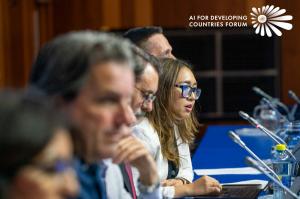AIFOD Summit at UN Vienna Reveals Game-Changing Frameworks for Inclusive AI Financing

Global delegates participate in Oxford-style debates on AI investment strategies at the AIFOD Vienna Summit 2025, where experts examined whether developing nations should prioritize infrastructure or applications, build or buy technology, and concentrate
Government ministers, ambassadors and UN agencies unveil practical frameworks for public-private partnerships in AI
VIENNA, AUSTRIA, July 30, 2025 /EINPresswire.com/ -- The AI For Developing Countries Forum (AIFOD) intensified its groundbreaking summit at the United Nations Office at Vienna with concrete solutions for bridging the AI investment gap, as government ministers, ambassadors, and United Nations agency representatives unveiled practical frameworks for public-private partnerships and blended finance mechanisms designed to unlock trillions in development opportunities for the Global South.
Building on the foundation that AI inequality represents a trillion-dollar opportunity, AIFOD's second day focused on actionable implementation strategies. The independent forum brought together leaders from over 30 nations, including ambassadors and high-level officials from Slovakia, Philippines, Colombia, Nigeria, Indonesia, and Papua New Guinea, demonstrating unprecedented global commitment to equitable AI development.
"How can public funds strategically de-risk private investments in AI infrastructure?" challenged Congressman Brian Poe Llamanzares of the Philippines, President of the AI Global Governance Council, in his opening keynote. "Can we create financial vehicles that align development values with profitable returns?" His questions framed AIFOD's mission to transform theoretical discussions into bankable projects.
The morning's "PPP Models That Work" roundtable, moderated by Olivier Grenet from Novartis, showcased successful frameworks already transforming nations. Hesti Aryani from JANZZ Technology emphasized: "AI readiness is no longer a technical benchmark but a strategic enabler for justice, infrastructure, and employment." Michael Hayward Dowding from Health on Cloud demonstrated practical AI applications addressing healthcare worker shortages, while Daniel Samaan from the International Labour Organization stressed workforce adaptation as critical to sustainable AI deployment.
Slovakia emerged as an unexpected leader in blended finance innovation. Director of Innovation Juraj Hostak shared his nation's model: "We're leveraging EU structural funds targeted at AI in public services, while developing an AI competence center that supports experimentation across institutions." This approach offers a replicable blueprint for AIFOD members seeking to maximize limited resources through strategic coordination.
Jason Slater, Chief AI and Innovation Officer at the United Nations Industrial Development Organization (UNIDO), reinforced United Nations commitment to inclusive development: "UNIDO focuses on how AI innovation can help member states, particularly developing countries. AI could positively impact 134 of the 169 SDG targets." His presentation highlighted partnerships with tech giants including Google and Microsoft, demonstrating how United Nations agencies facilitate connections between AIFOD's mission and global technology resources.
Revolutionary thinking emerged from the "Blended Finance Mechanisms" panel. Partha Gopalakrishnan of PG Advisors guided discussions that challenged traditional investment metrics. "We need measurement frameworks that account for global system complexity," argued Derrick T. Davis from University of Maryland Baltimore County, advocating for metrics incorporating human, cultural, and environmental capital alongside financial returns—directly supporting United Nations Sustainable Development Goals.
Indonesia's ambitious vision resonated throughout AIFOD. Sally Taher outlined plans to train 9 million digital talents by 2030, while candidly addressing barriers: "Without dedicated blended finance frameworks, clear risk-sharing structures, and aligned expectations between public and private sectors, these goals remain aspirational." Her insights sparked discussions on creating investment-ready proposals and building trust between sectors.
Three Oxford-style debates crystallized investment dilemmas. The Infrastructure vs Applications debate revealed consensus that both must evolve symbiotically. The Local Innovation vs Technology Transfer discussion emphasized hybrid models respecting sovereignty while accelerating progress. The final debate on investment scale saw overwhelming support for distributed approaches ensuring broad participation while maintaining competitiveness.
"Should we invest in one national AI lab or support 1,000 local startups?" moderator Nisar Ahmad Zafar asked panelists. Responses overwhelmingly favored portfolio strategies, with one participant noting: "We are all here representing distributed problem-solving. That's AIFOD's strength."
Concrete outcomes emerged throughout the day. Nigeria's regulatory sandbox model that produced five tech unicorns inspired similar frameworks. Papua New Guinea demonstrated AI governance across 800 languages and 600 islands. Colombia showcased AI applications in remote Amazon healthcare. These weren't theoretical—they were proven, scalable solutions ready for adaptation.
AIFOD's specialized working groups advanced FAIR Standards Development, addressing critical implementation challenges as AI deployment accelerates without adequate safeguards. Sub-committees on Respectful Entry, Shared Development, Data Governance, and Sustainable Impact worked to translate Ubuntu philosophy into measurable benchmarks for ethical AI deployment.
The collaboration between AIFOD and multiple United Nations agencies validated a new approach to development financing. With Global South markets showing explosive growth—Brazil at 28.61%, India at 34.4%, Indonesia at 28.65% annually versus North America's 19-20%—participants recognized that developing nations represent AI's future, not its charity case.
As AIFOD prepares for its final day exploring "third path" innovations, momentum builds toward comprehensive solutions. The summit proved that developing nations need not choose between sovereignty and speed, between inclusion and innovation. Through strategic partnerships with United Nations agencies and innovative financing mechanisms, AIFOD is transforming how the world thinks about AI investment—from extractive models to collaborative ecosystems that benefit all humanity.
The message from Vienna is clear: the digital divide can become a development dividend, but only through the practical frameworks, political will, and collaborative spirit demonstrated at this historic AIFOD summit.
Dawid Wiktor
Media Scope Group
email us here
Legal Disclaimer:
EIN Presswire provides this news content "as is" without warranty of any kind. We do not accept any responsibility or liability for the accuracy, content, images, videos, licenses, completeness, legality, or reliability of the information contained in this article. If you have any complaints or copyright issues related to this article, kindly contact the author above.


